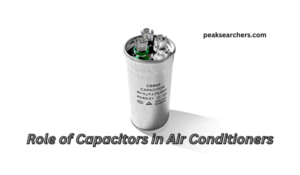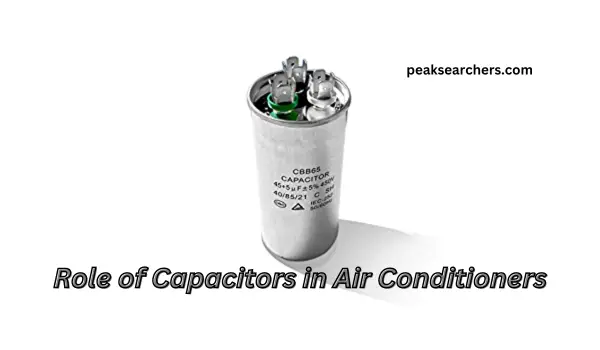Understanding the Role of Capacitors in Air Conditioners. A Comprehensive Guide
Air conditioners are one of the essential appliances that we use in our daily lives. They help us beat the heat during summer and provide us with a comfortable living environment. However, have you ever wondered how an air conditioner works, and what a capacitor does in an AC?
I also wanted to know the importance of a capacitor in my AC. One of my friends told me about capacitors. Here’s what I know about it. In this article, we will explore the functions of capacitors in air conditioners.

What is a Capacitor?
A capacitor is an electronic component that stores and releases electrical energy. It consists of two conductive plates separated by an insulating material and is commonly used in various electrical and electronic circuits.
In air conditioners, capacitors are primarily used to provide starting and running power to the compressor and fan motors.
Types of Capacitors in Air Conditioners
There are two main types of capacitors used in air conditioners: start capacitors and run capacitors. Start capacitors are used only during the initial startup of the compressor motor, and provide the necessary torque to overcome the static load of the system.
Run capacitors, on the other hand, are used throughout the operation of the system to provide a continuous source of power to the compressor and fan motors.
Importance of Capacitors in Air Conditioners
Capacitors play a crucial role in the efficient and reliable operation of air conditioning systems. Without capacitors, the compressor and fan motors would not have the necessary power to start up and run smoothly.
This can lead to a number of issues, such as reduced cooling capacity, higher energy consumption, and increased wear and tear on the components.
Symptoms of Capacitor Failure in Air Conditioners
Capacitors, like all electrical components, have a limited lifespan and can fail over time. Some common symptoms of capacitor failure in air conditioners include:
- Failure to start or run the compressor or fan motors
- Reduced cooling capacity or airflow
- Unusual noises or vibrations from the system
- Frequent cycling on and off of the system
- Increased energy consumption or utility bills
If you notice any of these symptoms, it is important to have your air conditioning system inspected and serviced by a qualified HVAC technician.
Capacitor Replacement and Maintenance
Capacitor replacement and maintenance is a routine task that should be performed by a licensed and experienced HVAC professional.
Capacitors can store electrical charge even when disconnected from the power source, which can pose a safety hazard if not handled properly.
Additionally, selecting the correct capacitor type and size is critical to the proper operation of the system.
FAQ’s
What is the average lifespan of a capacitor in an air conditioner?
The average lifespan of a capacitor in an air conditioner is around 10 years. However, it can vary depending on factors such as usage, exposure to high temperatures, and voltage fluctuations.
Can I replace a capacitor in my AC unit myself?
It is not recommended to replace a capacitor in an AC unit yourself, as it can be dangerous and can cause damage to the unit if not done correctly. It is best to leave
How do I know what capacitor to use for my AC unit?
How do you know if an AC capacitor is bad?
There are several signs that can indicate a bad AC capacitor:
- The AC unit does not turn on or has trouble starting.
- The air conditioning system runs but does not produce cool air.
- The AC unit makes strange noises, such as buzzing or humming.
- The AC unit turns off on its own or trips the circuit breaker.
- The capacitor appears swollen or leaking.
If you notice any of these signs, it’s best to have an HVAC technician inspect and diagnose the issue. A bad capacitor can cause damage to other parts of the AC unit if left unaddressed, so it’s important to have it repaired or replaced as soon as possible.
Will the AC fan run if the capacitor is bad?
If the capacitor that powers the fan motor in your AC unit is bad, the fan may not run or may run at a slower speed than usual.
This is because the capacitor provides the initial electrical boost to start the fan motor and helps to maintain a steady voltage supply. Without the capacitor’s support, the fan may struggle to start or may not start at all.
However, other factors such as a faulty motor or electrical problems can also cause the fan to malfunction. If you suspect an issue with your AC fan, it’s best to have an HVAC technician inspect and diagnose the problem.
Also Read: How to Stop Dripping Noise from Air Conditioners? A DIY Guide
Conclusion
In conclusion, capacitors are a vital component of air conditioning systems, providing the necessary power to start and run the compressor and fan motors.
By understanding the role of capacitors and monitoring for signs of failure, you can help ensure that your air conditioning system runs smoothly and efficiently for years to come.


